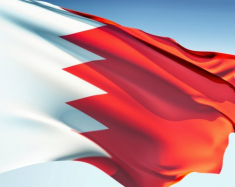So, next up is a guide to religious celebrations and bank holidays here in Bahrain. As you know we are currently in the ninth month of the Islamic Hijri Calendar called ‘Ramadan’. ‘Ramadan’ stands for ‘the hot month’ as it translates as ‘to be burnt/scorched’ and it is believed that ‘Ramadan’ was originally a summer month. Half way through the month of fasting you might come across a little celebration called ‘Gergaoon’. It is the mid-Ramadan night’s celebration in which children wander from house to house while singing the traditional song of ‘Gergaoon’ to ask for treats.
The celebration of Eid al-Fitr is also known as the ‘Festival of Breaking of the Fast’ or ‘Sugar Festival’ and marks the end of fasting and the holy month of Ramadan. It is Islamic custom to celebrate Eid with a small sweet breakfast, and to give to charity before official Eid prayers (called ‘Salaat al-Eid’). Many Muslims celebrate by giving gifts, wearing new or festive clothes, and visiting friends and family. This year ‘the small Eid’, as it is also called, starts on Friday, 17 July and lasts for three days.
On a side note, the first day of Eid marks the start of the tenth month of the Islamic calendar called ‘Shawwal’ followed by ‘Dhu al-Qa’dah’ meaning the ‘the one of truce’ (eleventh month) and ‘Dhu al-Hijjah’ as ‘the one of pilgrimage’ marking the annual ‘Hajj’ or pilgrimage to Mecca (twelfth month). During these two months war historically is banned.
The public holiday after that is Day of Arafah which falls on the 9th day of ‘Dhu al-Hijjah’ (this year on 22 September 2015) and is the second day of the ‘Hajj’ pilgrimage. This day commemorates the Prophet Muhammad’s (PBUH) last sermon standing on Mount Arafah near Mecca. Some Muslims will also fast on this day as it is common belief that the Prophet Muhammad (PBUH) said that fasting on the day of Arafah forgives all the minor sins of the past year and coming year.
The day after sees the start of the second official Muslim holiday called Eid al-Adha or the ‘Festival of the Sacrifice’. It honours the willingness of Abraham to sacrifice his promised son, Ishmael, as an act of obedience to God. As Abraham was about to kill his son, Allah stopped him and gave him a lamb to sacrifice instead. Since then Eid al-Adha is celebrated by slaughtering a sheep. Eid al-Adha will start on 23 September this year and will continue for three days.
Next up is Al Hijira or Islamic New Year! Coming full circle, ‘Muharram’ is the first month of the year and the word stems from the Arabic word ‘harram’ meaning that all kind of battles are ‘forbidden’. The tenth day of that month sees the ‘Day of Ashoora‘ (‘asha’ra’ means 10 in Arabic). This is the only day Alosra (local supermarket) is closed for the day! It is the day when Shi’a Muslims mourn the martyrdom of Husayn ibn Ali. He was one of the grandsons of Prophet Muhammad (PBUH) and was killed at the Battle of Karbala on that day in 680 AD during a time of turmoil between the Prophet’s descendants over whose right it was to lead the Islamic community. This day is said to have essentially split the Islamic empire into two spheres – the Sunni (from “Ahl al-Sunna”, the people of the tradition) and the Shi’a (literally “Shiat Ali” or the party of Ali who was Prophet’s son-in-law).
16. December marks Bahrain National Day and is followed by another bank holiday of National Day Celebration on 17 December. Although 15  August 1971 is the actual date on which Bahrain gained its independence from the British, the state annually celebrates 16 December to coincide with the day that former ruler Isa bin Salman Al Khalifa became the 1st Emir of Bahrain in 1961. This is the only time when you will be able to see a firework display as part of any public holiday (no fireworks on New Year’s Eve here!).
August 1971 is the actual date on which Bahrain gained its independence from the British, the state annually celebrates 16 December to coincide with the day that former ruler Isa bin Salman Al Khalifa became the 1st Emir of Bahrain in 1961. This is the only time when you will be able to see a firework display as part of any public holiday (no fireworks on New Year’s Eve here!).
Prophet’s Birthday or ‘Mawlid’ is to celebrate the birthday of the Prophet Muhammad (PBUH) which falls on the twelfth day of ‘Rabi’ al-Awwal’ (meaning ‘the first spring’), the third month in the Islamic calendar. This year it looks like it will fall onto 24 December meaning that Christmas Eve will be a bank holiday for once!
This just leaves us with two more bank holidays which are New Year’s Day making 1 January a public holiday as well as Bahrain Labour Day on 1 May.
If, however, any of these day falls onto our weekend (Friday or Saturday) then Bahraini law stipulates compensation for public sector employees meaning that the Sunday after is public holiday. To check actual dates of public holidays check the website of the Central Bank of Bahrain. Private sector employees, however, don’t enjoy the same benefit so malls and shops are mostly open!

We are in Kuala Lumpur at the moment during Ramadan and going out in the afternoon to the bazaars for food is a huge treat 🙂
LikeLike
Reblogged this on BUCKET-LESS Blog and commented:
Another great read! (If you’re interested in Ramadan and other key holidays!)
Thanks ilke!
…Carala
LikeLike